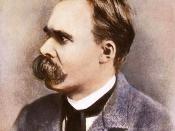One philosophical idea that has had significant consequences is Nietzche's idea of "will to power," and of expressing that idea.
Nietzche's will to power was his recommendation in the face of a life of lying. Nietzche believed that there is no "pure being"; no gods, no forms, simply no "things". In essence, there is no knowing. One cannot know something, one can only invent it. In doing so, it is lying.
Nietzche considered his "will to power" lying creatively, and lying creatively is O.K., according to Nietzche. Creative lying is noble lying, as long as those lies affirm life--all other lies are nihilistic and bad.
To express will to power, one forces reality to bend to one's own will. Will to power may sound evil, but Nietzche believed that will to power "must be full of dancing, laughter, and affirmation." He shunned Christianity because it denies this world as it really is, and in longing for another world, Christians long for death instead of this life.
That statement of Nietzche's is a very interesting one to me, because it seems Nietzche had a lust for life. He wanted laughter and merriment, and not the dreary, restricted life of religion.
It was Nietzche's embodiment of will to power that had a major impact on an entire side of the world: Der Ubermensch, or the overman. The overman represented triumph of will to power, and he taught dance, and laughter as well as a continuous, endless existence Nietzche called "eternal recurrance."
Under Hitler, the Nazis tood the idea of an Ubermensch and ran with it so far as to fall off a cliff. Because of this, many people think that the Nazis based their ideals around Nietzche, but it was the twisted mind of one evil...


